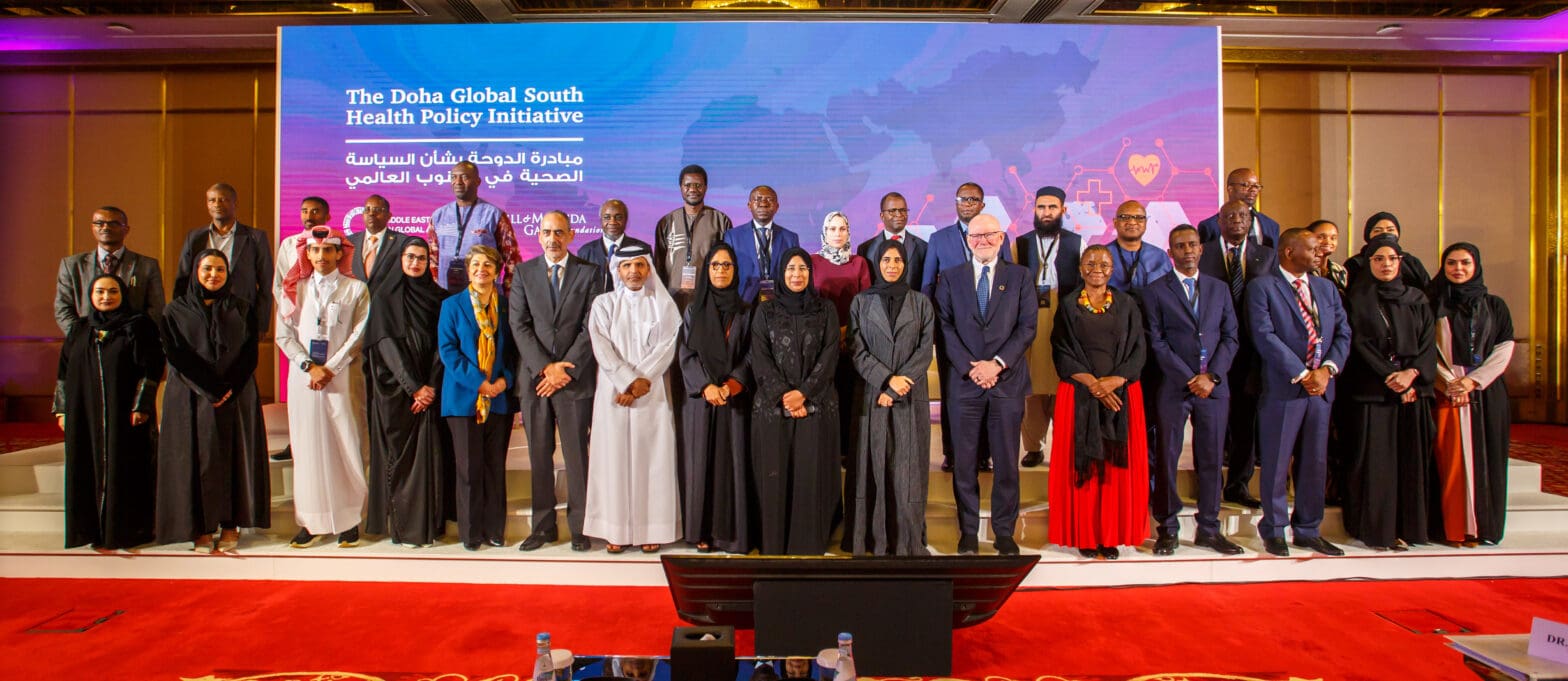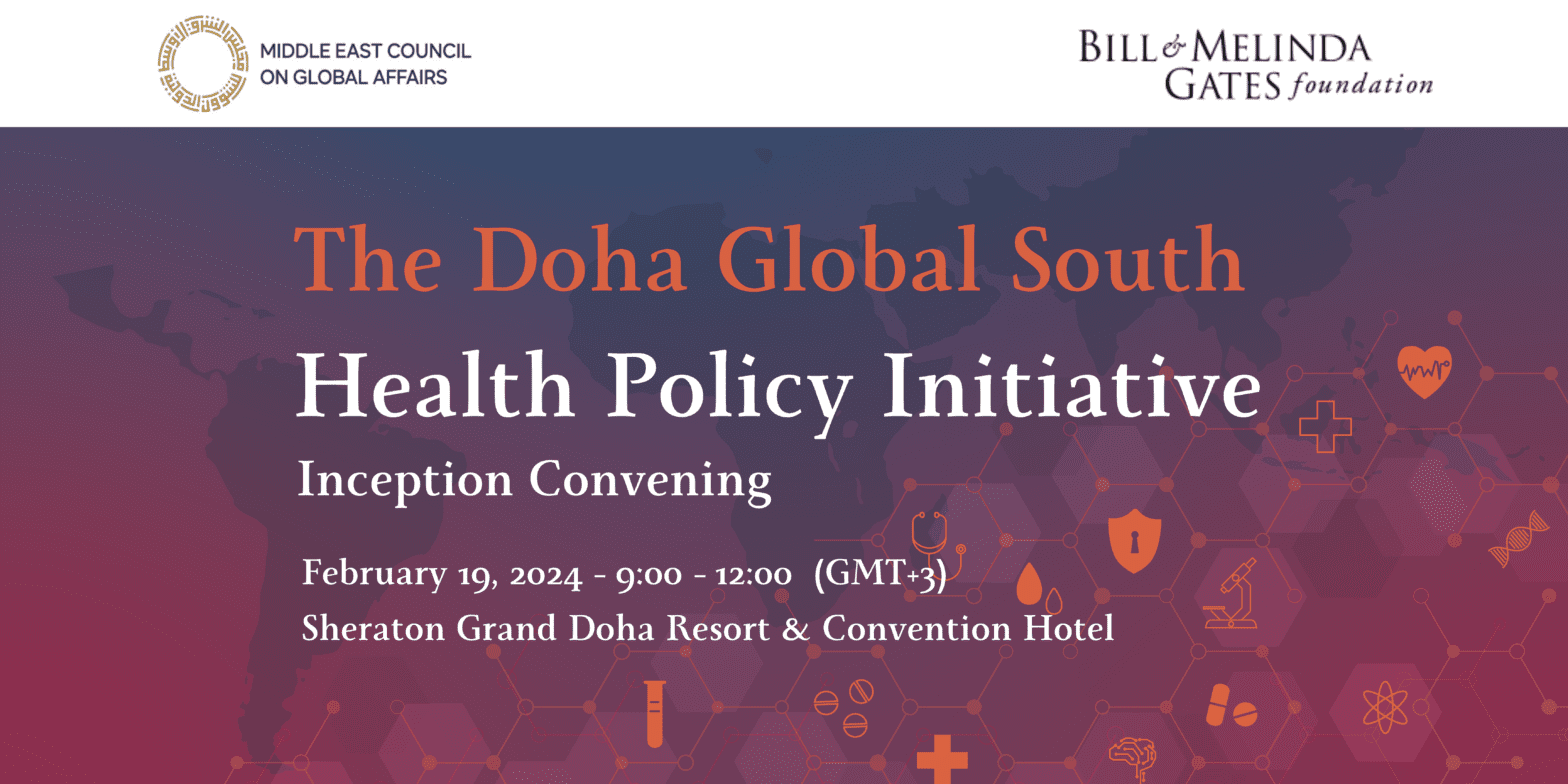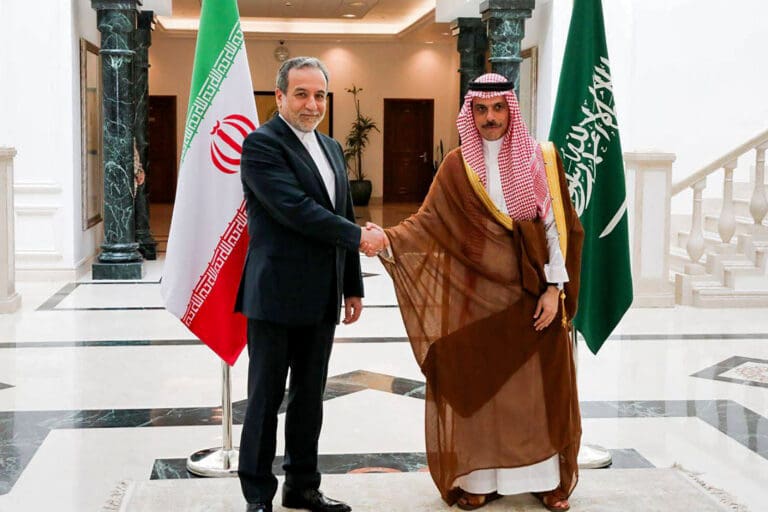
Inception Convening:
The Doha Global South Health Policy Initiative
Summary Report
Affiliated Publication, August 2024
Executive Summary
In February 2024, the Middle East Council on Global Affairs (ME Council) and the Bill and Melinda Gates Foundation (the Gates Foundation), with the support of Qatar’s Ministry of Foreign Affairs, convened an inaugural meeting of the Doha Global South Health Policy Initiative in Doha. The initiative was conceived as a response to stagnating health indicators in low- and middle-income countries (LMICs), even before the COVID-19 pandemic, despite global commitments and significant funding from global health initiatives. The initiative aims to convene senior public health officials from LMICs to exchange knowledge and share insights in order to identify barriers in health policy implementation and propose effective solutions.
The inaugural convening focused on improving access to primary healthcare services in the Global South, bringing together senior public health officials from Afghanistan, Burkina Faso, the Democratic Republic of Congo, Ethiopia, Malawi, Mozambique, Niger, Nigeria, and Somalia, international experts, representatives of international organizations, and Qatari stakeholders from the Ministry of Public Health, the Ministry of Foreign Affairs, the Qatar Fund for Development, the College of Health Sciences at Qatar University, and the College of Public Policy at Hamad Bin Khalifa University.
Participants began by presenting and discussing key challenges and experiences, then broke into groups to brainstorm what is needed and make specific recommendations. Finally, they reconvened as a group to discuss how the convening and the wider initiative could support their efforts.
Challenges and Experiences: Participating officials noted critical needs and gaps in the delivery of primary healthcare services (particularly in maternal and child health, and immunization) in the following key areas: (1) a shortage of well-trained and well-compensated healthcare professionals; (2) weak institutional capacity, particularly in decision-making and the implementation of policies and projects; (3) effective resource allocation and sustainable funding, including dependency on donor agendas; (4) weak program management, including within strategic planning, governance, coordination, and financial management; and (5) inadequate healthcare infrastructure and technology, such as the lack of well-equipped clinics, especially in remote areas.
What is Needed: Recommendations emerging from the convening include: (1) LMICs require more financial support in key areas, including maternal health, child health, and immunization; (2) LMICs must invest in healthcare workforce development; (3) community health workers should be trained and empowered to make evidence-based decisions; (4) LMICs should engage the private sector, creating partnerships in key areas such as pharmaceutical production and technological integration in healthcare; (5) LMICs must develop their capacity to engage in evidence-based discussions with donors and undertake donor mapping; and (7) LMICs require support in developing digital platforms, integrating datasets, standardizing indicators, and training officials in evidence.
The Role of the Convening: Participating officials suggested several key prospective future roles for the initiative: (1) the convening should continue to serve as a platform for senior public health officials and experts to exchange experiences, identify challenges, and brainstorm solutions; (2) between convenings, the initiative should undertake engagement activities, such as field visits, innovative pilot projects, implementation research, and remote learning; (3) the initiative should prioritize common themes, starting with mother and child health and immunization, with potential expansion to additional themes later; (4) support should be provided for LMICs to articulate priorities to donors, improve data collection and analysis for evidence-based decision-making; (5) a donor mapping exercise would help identify potential donors aligned with countries› priorities; and (6) the initiative should establish regular engagement with partners and outcome-oriented metrics to evaluate progress.
Download here the full report.
For more information: https://www.doha-gshi.com/
Copyright © 2024 The Middle East Council on Global Affairs.
The ideas and opinions expressed in this document reflect the participants’ discussion and do not necessarily reflect the views and opinions of the Middle East Council on Global Affairs or the Bill and Melinda Gates Foundation.
Related
Events

The Middle East Council on Global Affairs and the Bill & Melinda Gates Foundation, with the support of the Ministry of Foreign Affairs of the State of Qatar, have officially launched the Doha Global South Health Policy Initiative. To kick off this initiative, a high-level panel discussion titled "Enhancing Primary Healthcare Access in the Global South: Challenges and Solutions" was held on February 19, 2024, at the Sheraton Grand Doha. The event brought together representatives from nine low-and-middle-income Countries (LMICs) in Africa and Asia, alongside international experts and key stakeholders from Qatar, including the Ministry of Public Health, the Ministry of Foreign Affairs, Qatar Fund for Development, Qatar University, and Hamad Bin Khalifa University.
learn more


